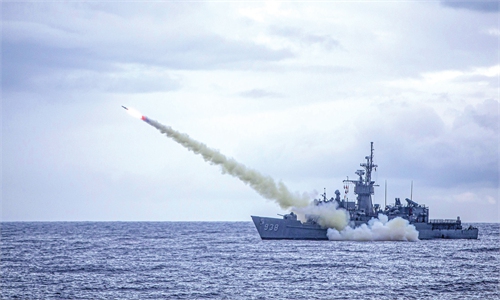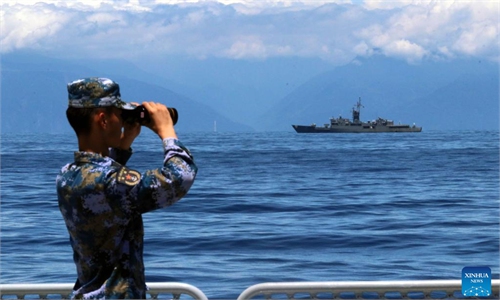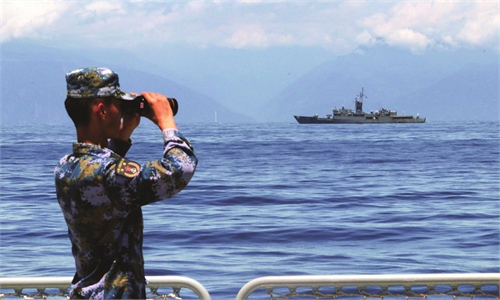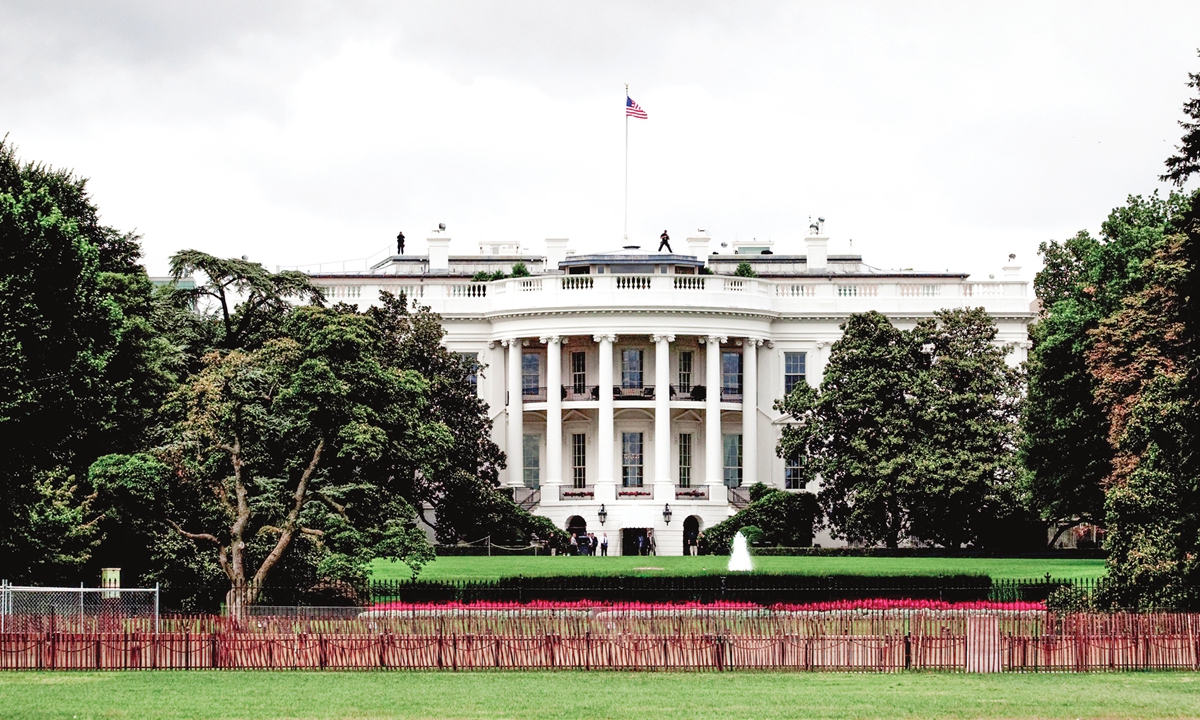
The White House Photo: VCG
Editor's Note:
Tensions in China-US relations and the Taiwan Straits situation caused by US house speaker Nancy Pelosi's early August provocative visit to the island of Taiwan continue to ferment. The Global Times (GT) interviewed four veteran diplomats and scholars to dig into the historical context surrounding the Taiwan question, give a true account of those historical moments, and analyze the profound impact of the current tension in the Taiwan Straits. These interviews are aimed at showing readers the back and forth between China and the US over the Taiwan question, and helping them better understand what the one-China principle is about. The Global Times plans to publish these interviews in two parts. The following are the interviews with Su Ge (Su), former president of the China Institute of International Studies, and Tao Wenzhao (Tao), honorary academician of the Chinese Academy of Social Sciences (CASS) and research fellow of the American Institute of the CASS.
Understanding the one-China principle
GT: How shall we define the one-China principle?
Su: I would like to make three points. First, the meaning of the one-China principle is clear and unambiguous. Taiwan has belonged to China since ancient times - both the historical evidence and legal facts are clear. In 1894, Japan waged the Sino-Japanese War, and occupied Taiwan and Penghu Islands. In 1943, the Cairo Declaration made by China, the US and Britain declared that all the territories Japan had stolen from the Chinese... shall be restored to China. In 1945, the Potsdam Proclamation reaffirmed "The terms of the Cairo Declaration shall be carried out." Therefore, the one-China principle has been an important part of the post-WWII world order arrangement. After the end of the Chinese People's War of Resistance against Japanese Aggression (1931-45), the Chinese government declared that it "resumes the exercise of sovereignty over Taiwan." In 1949, when the People's Republic of China was founded, the Central People's Government replaced the previous government to become the sole legal government representing the entire China.
Although China was not fully reunified due to the civil war and foreign intervention, China's sovereignty and territory have never been divided and Taiwan's status as part of China's territory has never changed. In 1971, the 26th session of the UN General Assembly adopted Resolution 2758 by an overwhelming majority, restoring all legitimate rights of the People's Republic of China in the UN, and the one-China principle was further confirmed. Today, 181 countries in the world, including the US, have established diplomatic relations with China on the basis of the one-China principle. At its core, the one-China principle means that there is only one China in the world, that Taiwan is an inalienable part of China's territory, and that the government of the People's Republic of China is the sole legitimate government representing the entire China.
Second, the one-China principle is the unshakable political foundation of China-US relations. When China and the US reconciled and established diplomatic relations, how to deal with the Taiwan question was at the heart of the negotiations. The core of the commitments made by the then and subsequent US administrations on the Taiwan question is the three joint communiqués. They are supposed to be the "guardrails" of China-US relations. In retrospect, however, the US has repeatedly reneged on its own commitments, such as allowing its senior officials to visit Taiwan, selling an increasing amount of arms with better performance to Taiwan, and helping Taiwan expand its "international space." Its attempts to impose restrictions on the one-China policy are becoming increasingly frequent.
Third, the one-China principle is the anchor for the peace and stability in the Taiwan Straits. After Nancy Pelosi's provocative visit to Taiwan, a very small fraction of foreign forces has followed the US in playing the "Taiwan card." Their intention is obvious: Using Taiwan as a pawn to suppress China's development and progress and obstruct the great rejuvenation of the Chinese nation, which actually constitutes challenges to the international law that respects the sovereignty and territorial integrity of all countries and to the peace in the Taiwan Straits and regional stability.
We have been unequivocal in saying that China will unswervingly follow the path of peaceful development, but at the same time will never back down in the face of any pressure of foreign interference, and will never tolerate any harm to our national sovereignty, security and development interests. China has the determination and the ability to do so. Therefore, as the DPP authorities in Taiwan "rely on the US to seek independence" and the US and a handful of other countries "exploit Taiwan to contain China," and as the US and the DPP authorities are in collusion and use each other, it is the people of Taiwan, the China-US relations, and the peace and stability of the Taiwan Straits that will be hurt.
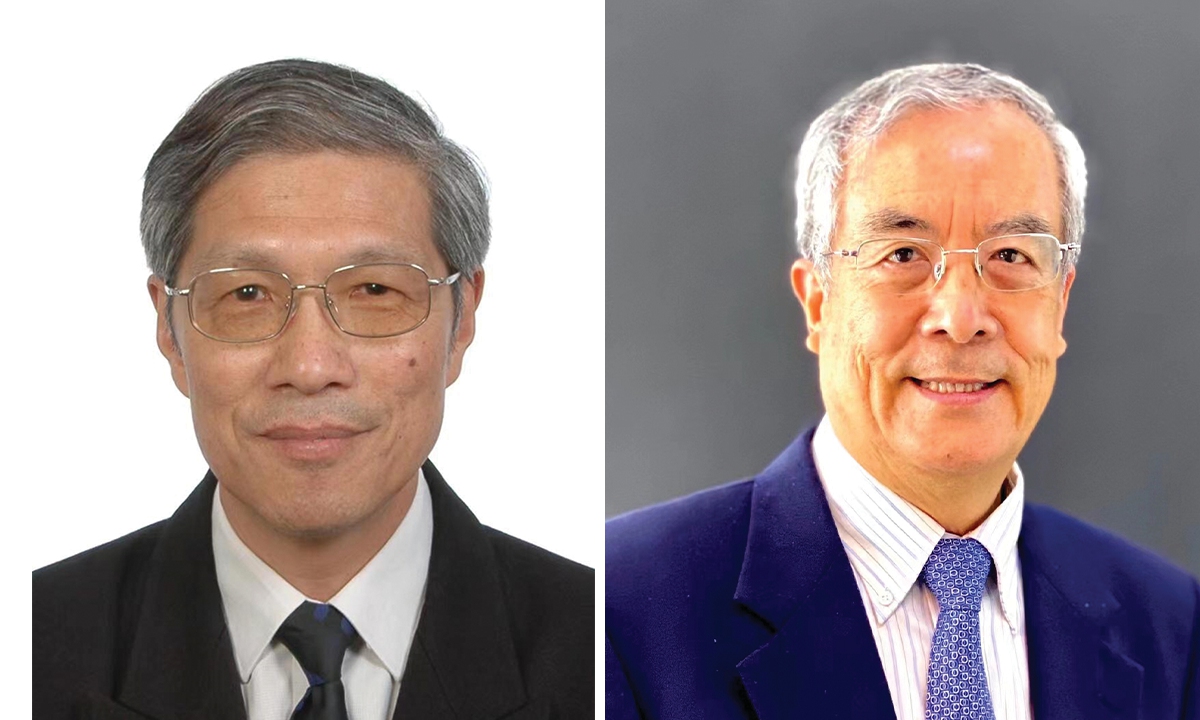
Tao Wenzhao (left) and Su Ge (right)
US intensifies violation of the one-China principle
GT: What commitments did the US side make on the Taiwan question when China and the US reconciled and prepared to establish diplomatic relations?
Tao: Before the establishment of diplomatic relations, Henry Kissinger made two visits to China in 1971, to prepare for then US president Richard Nixon's visit to China. Kissinger stated that the US would reduce the number of troops deployed in Taiwan and that military issues would not be a major obstacle to relations between the two countries. He pledged, "As for the political future of Taiwan, we are not advocating a 'two Chinas' solution or 'one China, one Taiwan' solution." Kissinger also assured that the US would not support the so-called Taiwan independence movement. He made clear the US commitments to the Chinese side, which served as a prerequisite for Nixon's "ice-breaking trip." President Nixon reconfirmed these commitments during his meeting with premier Zhou Enlai in 1972. The joint communiqué the two countries signed at that time clearly states, "The United States acknowledges that all Chinese on either side of the Taiwan Straits maintain there is but one China and that Taiwan is a part of China. The United States Government does not challenge that position."
In 1978, then US president Jimmy Carter resolved to normalize relations with China. The Carter administration accepted China's demand to "sever its diplomatic relations with Taiwan, withdraw its troops and military personnel from Taiwan and abrogate the Mutual Defence Treaty with Taiwan," but it also made a request to the Chinese side to renounce the use of force against Taiwan. Deng Xiaoping rejected this. The communiqué on the Establishment of Diplomatic Relations between the People's Republic of China and the United States further states that the US "recognizes the Government of the People's Republic of China as the sole legal government of China. Within this context, the people of the United States will maintain cultural, commercial and other unofficial relations with the people of Taiwan."
Immediately after the normalization of China-US relations, the Chinese side put the issue of US arms sales to Taiwan, which had been left pending during the negotiations on the establishment of diplomatic relations, on the agenda of the negotiations, and the two sides concluded the communiqué on August 17, 1982, in which the US side once again pledged that "it has no intention of infringing on Chinese sovereignty and territorial integrity, or interfering in China's internal affairs, or pursuing a policy of 'two Chinas' or 'one China, one Taiwan'." The core of the communiqué is Article VI: "the United States Government states that it does not seek to carry out a long-term policy of arms sales to Taiwan, that its arms sales to Taiwan will not exceed, either in qualitative or in quantitative terms, the level of those supplied in recent years since the establishment of diplomatic relations between the United States and China, and that it intends gradually to reduce its sale of arms to Taiwan, leading over a period of time to a final resolution."
GT: Since the establishment of diplomatic relations between China and the United States, what commitments have the successive US presidents made on the Taiwan question?
Tao: In negotiating the third communiqué, then US president Ronald Reagan wrote to the Chinese leadership in 1982 that their policy would continue to be based on the principle of one China.
During his state visit to China in 1998, US president Bill Clinton publicly stated that "we don't support independence for Taiwan, or 'two Chinas,' or 'one Taiwan, one China,' and we don't believe that Taiwan should be a member in any organization for which statehood is a requirement."
In his meeting with visiting Chinese premier Wen Jiabao in 2003, US president George W. Bush said that the recent statements and proposals coming out of Taiwan implied a desire to change the status quo, and that the US opposed any unilateral attempt to change the Taiwan status quo. This dealt a blow to radical separatists led by regional leader Chen Shui-bian.
Donald Trump took a congratulatory phone call from Tsai Ing-wen after his victory in the election in 2016, causing an avalanche of outrage. In response, the Obama administration repeatedly stated that the US' one-China policy had not changed.
GT: With so many commitments, why does the US always fail to keep them properly, leading to the Taiwan question to have repeatedly caused disturbances in China-US relations for decades?
Tao: Simply put, first, political need - politicians change their policies for the sake of votes. Second, interest groups influence politics. The US military-industrial complex acts behind the scenes to promote arms sales to Taiwan so that Taiwan will pay "protection money" to them. Third, ideology - the US political circles believe that Taiwan's so-called trends of democratization and localization are in line with US values. Last but not least, it is in the US strategic interest to obstruct China's reunification.
